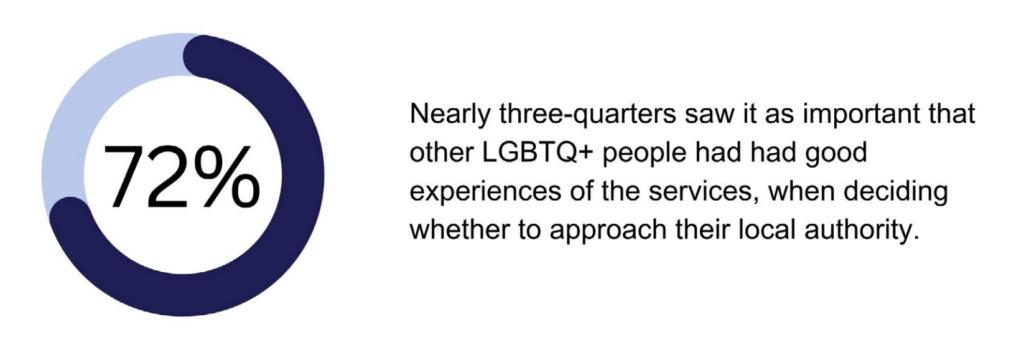
 Edith England and Neil Turnbull introduce the LGBTQ+ Housing and Homelessness Survey 2022-23.
Edith England and Neil Turnbull introduce the LGBTQ+ Housing and Homelessness Survey 2022-23.
Homelessness is an extreme form of social exclusion, widely recognised as a serious threat to immediate and long-term well-being. Homelessness causes ill health, affects access to education and work, and is associated with high levels of stigma and exclusion. Article 25 of the 1948 Universal Declaration of Human Rights recognises a right of access to adequate housing – housing that is safe, secure, and accessible, and that enables an individual and their household to participate fully in civil society and culture.
Since 1977, this approach to homelessness – as a lack of adequate home, rather than physical rooflessness – has been integrated into UK law. In the UK, the legal definition of homelessness is that a household has no home in the UK or elsewhere in the world available and that it is reasonable for them to occupy.
More recently, recognising homelessness as a serious and cumulative threat to immediate and longer term wellbeing, England, Scotland and Wales have centred measures to improve the early intervention and swift resolution of homelessness. These measures also explicitly expand the duration and types of help available, as well as who can access this help, in part to address a perceived failure to adequately address homelessness among those without children (Mackie et al., 2017).

Homelessness among LGBTQ+ people is under-researched, although the evidence we have is that, at least among certain groups, and with respect to certain types of homelessness, prevalence is high (Biggs, 2024; England, 2024; Guyan, 2022; Shaw, 2023; Yapp & Trace, 2023). The Albert Kennedy Trust famously found that nearly a quarter of young homeless people identified as LGBTQ+, with similar indicative figures found internationally, including in America and Canada.
Qualitative studies have been especially helpful in identifying specific issues in provision for those LGBTQ+ people who approach services – for instance, a lack of awareness of the signs of same-gender domestic abuse, or ways in which mainstream homelessness services are often difficult, dangerous and exclusionary places for LGBTQ+ people.
However, three crucial pieces of information are lacking.
First, we do not know how prevalent homelessness – as recognised under UK law – is among LGBTQ+ people as a group. Existing studies tend to focus on specific homelessness experiences, or ask for self-reported homelessness experiences. They also tend to consider a subsection of the LGBTQ+ population – often younger people, and often in a specific geographic location.
Second, existing studies tend to focus on past experiences of homelessness, rather than identifying which groups are at greater risk of homelessness in the near future.
Third, existing studies have tended to focus on what is wrong with services, rather than on ways that they could be improved.
 We wanted to produce data which both gave a good overview of the prevalence of homelessness for UK-based LGBTQ+ populations, and which explored ways that service provision might be improved. To address this, we developed the UK LGBTQ+ Housing and Homelessness Survey 2022-23.
We wanted to produce data which both gave a good overview of the prevalence of homelessness for UK-based LGBTQ+ populations, and which explored ways that service provision might be improved. To address this, we developed the UK LGBTQ+ Housing and Homelessness Survey 2022-23.
We took a broad and inclusive recruitment approach, primarily using physical and virtual community ‘outposts’ – cafés, bars, bookshops and community centres, alongside social media groups and adverts. Our survey was explicitly targeted at the whole LGBTQ+ population, rather than just those who believed themselves to have experienced homelessness. Where possible, we drew questions from standardised large surveys, including the English Housing Survey and Understanding Society, to enable direct comparability of answers. As well as demographic questions (sexual and gender identity, ethnicity, location, age, disability status and whether they had caring responsibilities) we asked about current and past experiences of both housing and homelessness (following the UK legal definition), and risk factors for homelessness, as well where they would turn if they became homeless.

Our results suggest that, among LGBTQ+ people in the UK, experiences of homelessness are widespread. Nearly half of our respondents indicated that they had had at least once experience of homelessness in their adult lives, including a fifth within the last year. Some forms of homelessness were especially prevalent. For instance, a third had sofa surfed within the last year.
Loss of home was also a prevalent concern, with one in ten believing that they were likely to lose their home within the next year and a fifth having at least one risk factor (e.g. rent arrears or threatened eviction) for homelessness in the next twelve months. Despite this, only a third indicated that they would be willing to engage with the Local Authority (for instance, by making a homelessness application) if they did become homeless – they were much more likely to seek help from friends and/or family.
When broken down by demographic groups, these broad patterns remained. However, some groups were both especially likely to have experienced homelessness and to be at risk of future homelessness. Those who were trans, non-binary and/or agender, from a minority ethnic group, and/or disabled were all much more likely to report having been homelessness in the last year, and being from a minority ethnic group, disabled, trans, non-binary and/or agender or under 25 were all associated with increased risk of homelessness in the next year.
“It is especially difficult to find housemates if you are trans, which can affect housing options.”
We also asked some questions about what might encourage engagement with authorities, and what factors were important to them in well-designed homelessness services. These were indicative and designed to facilitate the next stage of our research (see below for more details of this!).
We found that LGBTQ+ people as a group prioritised two factors in deciding whether to approach services: whether the service had a good reputation for working with LGBTQ+ people (for instance, whether others had had a good experience) and whether they understood the practical steps needed (for instance, how to make an application).
However, we found some variation in this. For instance, provision of specialist LGBTQ+ homelessness accommodation tended to be important to younger people (those under 25) and trans, non-binary and agender people, as was provision of specialist LGBTQ+ services. Although trans, non-binary and agender respondents were relatively more likely to see it as helpful when services asked for pronouns, and where there was evidence of active trans, non-binary and agender inclusion (for instance, posters), all groups saw this as important. As one respondent put it:
“I am not myself trans but trans people are under our umbrella and if staff need training so as to treat them with dignity and respect they should have it.”
Next steps
You can read the report here. We would love to hear your feedback. You can email us at the addresses below.
During July 2024 we will be conducting a consultation based on the report findings. We want to explore workable ways that homelessness services could be meaningfully improved for LGBTQ+ people. If you are an LGBTQ+ person, or work in housing or homelessness (whether for a local authority or third sector organisation) or with LGBTQ+ service users and/or communities, we would love to hear from you. Please sign up here.
Please contact Edith (EEngland@CardiffMet.ac.uk) or Neil (TurnbullN1@Cardiff.ac.uk).
About the authors
Dr Edith England is a Senior Lecturer in Social Policy and Practice at Cardiff Metropolitan University. Edith’s research focuses on access to welfare, and homelessness and insecure housing, especially among marginalised groups. Ongoing projects include the 2022/23 LGBTQ+ Housing and Homelessness Survey (with Dr Neil Turnbull), and (with Dr Josie Henley) the Neurotopias project.
Neil Turnball is a lecturer at the Welsh School of Architecture, Cardiff University, where he teaches on the master’s in urban design. His primary research interests concern exploring different realms of community infrastructure bring together themes of community action, care, progressive practice, and queer space.

Thanks for helping to put my own experiences into context. I have had 3 distinct periods of homelessness and one of these was during my transition, while I was working in prison. I lost my council flat because my work was too distant from my home to commute and I relied on someone to pay the bills while I worked away and privately rented a flat. I was let down very badly. Later, as my career developed I was in a position to support research in a homelessness services charity. Where the standard assessment forms produced data suggesting that 5% of the client group identified within the LGBT+ spectrum, the peer research we developed revealed a more accurate figure around 25%, which tallies with the data in the article. Subsequently, after more developments and clent engagement, we established the first LGBT homeless hostel int he London region.